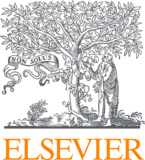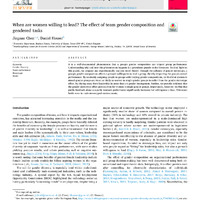When are women willing to lead? The effect of team gender composition and gendered tasks
Item
-
Title
-
en_US
When are women willing to lead? The effect of team gender composition and gendered tasks
-
Creator
-
Chen, Jingnan
-
Date
-
2020-07-01T20:33:19Z
-
Abstract
-
en_US
It is a well-documented phenomenon that a group's gender composition can impact group performance. Understanding why and how this phenomenon happens is a prominent puzzle in the literature. To shed light on this puzzle, we propose and experimentally test one novel theory: through the salience of gender stereotype, a group's gender composition affects a person's willingness to lead a group, thereby impacting the group's overall performance. By randomly assigning people to groups with varying gender compositions, we find that women in mixed-gender groups are twice as likely as women in single-gender groups to suffer from the gender stereotype effect, by shying away from leadership in areas that are gender-incongruent. Further, we provide evidence that the gender stereotype effect persists even for women in single-gender groups. Importantly, however, we find that public feedback about a capable woman's performance significantly increases her willingness to lead. This result holds even in male-stereotyped environments.
-
Publisher
-
en_US
John Antonakis; Elsevier Inc.
-
Is Part Of
-
The Leadership Quarterly. Volume 30, Issue 6, December 2019, 101340
-
Subject
-
en_US
Gender Diversity
Diversidad de Genero
MBA600
-
Type
-
en_US
Article
-
Date Available
-
2020-07-01T20:33:19Z
-
Date Issued
-
2019
-
Identifier
-
1048-9843
-
Language
-
en_US
Eng.



